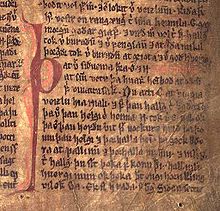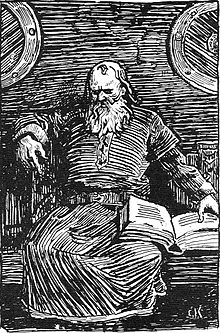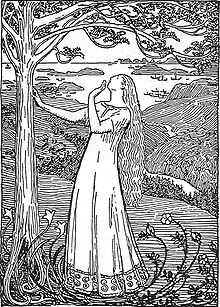- Saga
-

This article is part of a series on:
Old NorseDialectsUse- Orthography
- Runic alphabet
- (Younger Futhark · Medieval)
- Latin alphabet
- Grammar
- Phonology
- Morphology
LiteratureAncestorsThe sagas (word originating from Old Norse) are stories about ancient Scandinavian and Germanic history, about early Viking voyages, the battles that took place during the voyages, about migration to Iceland and of feuds between Icelandic families. They were written in the Old Norse language, mainly in Iceland.
The texts are epic tales in prose, ...often with stanzas or whole poems in alliterative verse embedded in the text, of heroic deeds of days long gone, "tales of worthy men," who were often Vikings, sometimes Pagan, sometimes Christian. The tales are usually realistic, except legendary sagas, sagas of saints, sagas of bishops and translated or recomposed romances. They are sometimes romanticised and fantastic, but always dealing with human beings one can understand.
Contents
Background
The term saga originates from the Norse saga (pl. sögur), and refers to (1) "what is said, statement" or (2) "story, tale, history". It is cognate with the English word "say", and the German sagen. Icelandic sagas are based on oral traditions and much research has focused on what is real and what is fiction within each tale. The accuracy of the sagas is often hotly disputed. Most of the manuscripts in which the sagas are preserved were taken to Denmark and Sweden in the 17th century, but later returned to Iceland.
There are plenty of tales of kings (e.g. Heimskringla), everyday people (e.g. Bandamanna saga) and larger than life characters (e. g. Egils saga). The sagas describe a part of the history of some of the Nordic countries (e.g. the last chapter of Hervarar saga). The British Isles, northern France and North America are also mentioned. It was only recently (start of 20th century) that the tales of the voyages to America were authenticated.
Most sagas of Icelanders take place in the period 930–1030, which is called söguöld (Age of the Sagas) in Icelandic history. The sagas of kings, bishops, contemporary sagas have their own time frame. Most were written down between 1190 to 1320, sometimes existing as oral traditions long before, others are pure fiction, and for some we do know the sources: the author of King Sverrir's saga had met the king and used him as a source.
Classification
Norse sagas are generally classified as: the Kings' sagas (Konungasögur), Icelanders' sagas (Íslendinga sögur), Short tales of Icelanders (Íslendingaþættir), Contemporary sagas (Samtíðarsögur or Samtímasögur), Legendary sagas (Fornaldarsögur), Chivalric sagas (Riddarasögur) and Saga of the Greenlanders (Grœnlendingasögur).
The Kings' Sagas are of the lives of Scandinavian kings. They were composed in the 12th to 14th centuries. The Icelanders' sagas (Íslendinga sögur) are heroic prose narratives written in the 12th to 14th centuries of the great families of Iceland from 930 to 1030. These are the highest form of the classical Icelandic saga writing. Some well-known examples include Njáls saga, Laxdœla saga and Grettis saga. The material of the Short tales of Icelanders sagas is similar to Íslendinga sögur, in shorter form. The narratives of the Contemporary Sagas are set in 12th- and 13th-century Iceland, and were written soon after the events they describe. Most are preserved in the compilation Sturlunga saga. The Legendary Sagas blend remote history with myth or legend. The aim is on a lively narrative and entertainment. Scandinavia's pagan past was a proud and heroic history for the Icelanders. The Chivalric Sagas are translations of Latin pseudo-historical works and French chansons de geste as well as native creations in the same style.
Other
- Styrbjarnar þáttr Svíakappa
- Hróa þáttr heimska
- Eymundar þáttr hrings
- Eindriða þáttr ok Erlings
The term in contemporary Nordic languages
Through the centuries, the word saga has gained a broader meaning in Nordic languages. In contemporary Swedish and Danish it describes a non-realistic or epic work of fiction. Folksaga means folk tale; a fairy tale by an unknown author, in Swedish and Danish. Konstsaga is the Swedish term for a fairy tale by a known author, such as H. C. Andersen or Astrid Lindgren, while the Danish and Norwegian term is eventyr ("adventure"). A saga can also be a work of fantasy fiction. J. R. R. Tolkien's Lord of the Rings series was translated to Swedish by Åke Ohlmarks by the title Sagan om ringen: "The Saga of the Ring". Tolkien knew enough Swedish to be dissatisfied with the Swedish title (and the translation work in general), and the 2004 translation was titled Ringarnas herre, a literal translation from the original.
In Swedish history, the term sagokung, "saga king" is intended to be ambiguous, as it describes the semi-legendary kings of Sweden, who are known only from unreliable, probably fictional, sources.
In Faroese, the word underwent U-umlaut becoming søga, and adopted a wider meaning. In addition to saga, it also covers terms such as history, tale, story.
A modern example of a saga is George Lucas's classic film trilogy, The Star Wars Saga. The Lord of the Rings novels by J.R.R. Tolkien are also a saga.
External links and references
- Icelandic Saga Database - The Icelandic sagas in the original old Norse along with translations into many languages
- Old Norse Prose and Poetry
- The Icelandic sagas at Netútgáfan
- The Finnwife's Prophecy, English translation of an Icelandic Saga from "Fuenf Geschichten aus dem westlichen Nordland", Prof. Felix Niedner
Narrative Character Plot Climax · Conflict · Dénouement · Dialogue · Dramatic structure · Exposition · Falling action · Plot device · Subplot · Trope-ClichéSetting Theme Style Diction · Figure of speech · Imagery · Literary technique · Narrative mode · Stylistic device · Suspension of disbelief · Symbolism · ToneForm Fable-Parable · Fabliaux · Fairy tale · Flash story · Folktale-Legend · Hypertext · Novel · Novella · Play · Poem · Screenplay · Short story · List of narrative formsGenre Adventure · Comic · Crime · Docufiction · Epistolary · Erotic · Faction · Fantasy · Historical · Horror · Magic realism · Mystery · Paranoid · Philosophical · Political · Romance · Saga · Satire · Science · Speculative · Superhero · Thriller · UrbanNarrator Alternating person · First-person · Second-person · Third-person · Third-person limited · Third-person objective · Third-person omniscient · Third-person subjective · Stream of consciousness · UnreliableTense Medium Related Literature portal Categories:- History of the Germanic peoples
- Medieval literature
- Sagas
- Sources of Norse mythology
- Icelandic literature
- North Germanic languages
- Medieval Scotland
- Old Norse literature
Wikimedia Foundation. 2010.



